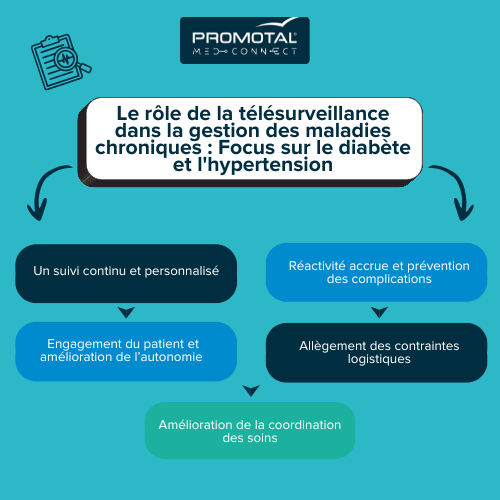
Teleconsultation, a key component of telemedicine, is playing an increasingly important role in the management of chronic diseases. As health professionals, you know how crucial regular follow-up is for your patients, whether for diabetes, hypertension, asthma or cardiovascular diseases. Teleconsultation, through its flexibility and accessibility, offers an effective response to these needs while improving the quality of life of patients and the fluidity of our medical practice.
In this article, we will highlight the main advantages of teleconsultation for the monitoring of chronic diseases and how it can optimize our daily care.
I. Easier access to care for chronic patients
Patients with chronic conditions often need to visit your office frequently to monitor their condition, adjust treatments, or simply discuss their progress. As practitioners, you know how restrictive these trips can be for them.
- Fewer trips, more comfort : Teleconsultation makes it possible to remove this obstacle. Patients, often fragile or with loss of mobility, can now consult from home. This not only reduces tiring travel, but also provides faster access to care, especially for those living in rural areas or remote from major medical infrastructures.
- Reduced waiting times : As a practitioner, you know that in-office consultations can lead to significant wait times. Thanks to teleconsultation, you can offer faster appointments, which allows you to intervene earlier, adjust treatments without delay and avoid worsening symptoms.
II. More regular and proactive follow-up
One of the great advantages that you can see in teleconsultation is the possibility of improving the regularity of follow-up without increasing the workload or complicating the lives of patients.
- Close monitoring for more safety : Chronic diseases often require constant monitoring. Thanks to teleconsultations, you can increase the frequency of consultations, especially for patients who require close follow-up, without requiring their systematic presence in the office. This ensures continuous monitoring and reduces the risk of complications.
- Real-time monitoring with connected devices : You now have the ability to monitor health parameters remotely thanks to connected objectss. These devices send data directly to our platforms, allowing us to adjust treatments in real time. For example, a diabetic patient can share their blood glucose results remotely, allowing us to respond immediately if needed.
III. Customizing the care path
Teleconsultation offers you an increased ability to individualize care according to the specific needs of each patient.
- Adaptation of consultations on a case-by-case basis: As professionals, you know that each patient has unique needs. Teleconsultation allows you to personalize the frequency and content of consultations according to the evolution of the disease, without imposing a standardized rhythm. You can adapt care to periods of stabilization or crisis more easily.
- Empowering patients: By promoting self-monitoring via connected devices and remote consultations, teleconsultation encourages our patients to become more active in managing their disease. This empowerment reinforces their involvement and, often, improves long-term clinical outcomes.
. Improving patients' quality of life
As health professionals, you have seen that the constraints of physical consultations can have a direct impact on the quality of life of chronic patients. Teleconsultation reduces this burden considerably.
- Reducing caregiving stress: The simplicity of a home consultation reduces patients' anxiety related to travel, waiting rooms or even the fear of hospitalization. They can now consult in a familiar setting where they feel more secure.
- Increased responsiveness in case of urgent need: You can respond more quickly in the event of a sudden deterioration in health. Rather than going through the emergency room, a remote consultation allows you to immediately assess the situation, adjust the treatment, and sometimes avoid hospitalization.
. Better coordination of care
Chronic diseases often involve several health professionals: general practitioners, specialists, nurses, etc. Teleconsultation greatly facilitates this interprofessional collaboration.
- Simplified sharing of medical data : Thanks to digital tools, you can share test results, medical records or clinical observations in real time with other health professionals involved in patient follow-up. This promotes better coordination and a smoother continuity of care.
- Immediate access to specialist advice: In more complex cases, teleconsultation allows you to quickly seek specialized advice via our tele-expertise platform. This guarantees faster care without the need for multiple face-to-face appointments.
. Reduced costs for patients and the healthcare system
As practitioners, you are aware that regular consultations and frequent hospitalizations represent a significant cost for patients and for the health system.
- Fewer avoidable hospitalizations: Thanks to increased surveillance via teleconsultation, we can prevent many serious complications, thus avoiding costly and often avoidable hospitalizations.
- Saving time and resources for patients: For patients, avoiding frequent trips, medical leave, or transportation costs results in substantial savings. They can also better manage their schedule, which helps improve their overall quality of life.
Conclusion
Teleconsultation is proving to be a powerful tool for monitoring chronic diseases. It allows you to monitor your patients in a more regular, proactive and personalized manner, while improving access to care and reducing costs and logistical constraints. By integrating teleconsultation into your daily practices, you offer your patients a modern, responsive and flexible solution that contributes to better management of their health.
In the context of the monitoring of chronic diseases, teleconsultation is now an essential strategy to offer quality care that is accessible and adapted to the specific needs of each patient. For you, health professionals, it paves the way for a more effective practice that focuses on the well-being of the patient in an increasingly connected world.


.png)


